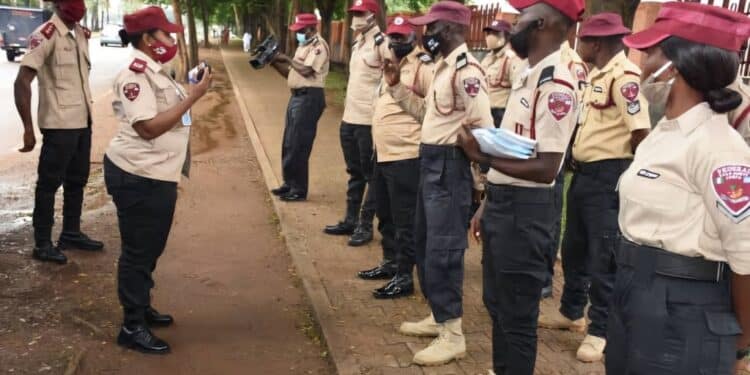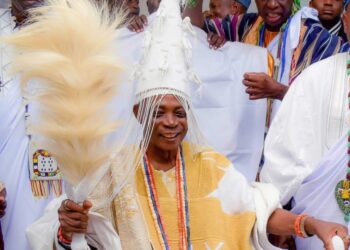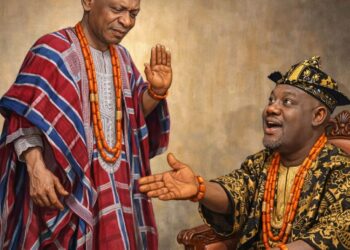“Employing The Principles Of Public Relations In Achieving Effective Communication With The Public: FRSC Station Officers’ Perspective” is a paper presented by Dapo Falade, Editor/CEO, Newscoven.com and a former Deputy Editor with the Nigerian Tribune, Nigeria’s oldest surviving national newspaper, at the Fourth Quarter Workshop for all Local Government Station Officers, held at the Conference Hall, Federal Road Safety Corps (FRSC), Oyo State Command, Eleyele, Ibadan, on Tuesday, 26 November 2024.
Protocols:
Please permit me to say that I was greatly humbled when the lot fell on me to complete this arduous task. How can I stand before this great gathering to speak on issues around the above subject matter? It is intimidating. I only hope that my little contribution here today will help further the essence and commitment of the Federal Road Safety Corps (FRSC) to safeguarding lives and reducing, to the barest minimum level, carnage on our roads, otherwise known as Road Traffic Crashes (RTC).
This workshop seeks ways to help the local government station officers improve their professional skills towards quality service delivery. The workshop also aims to boost the image of FRSC at the grassroots through quality public enlightenment. To be able to do justice to this, we need a better understanding of some salient issues as follows:
What is Public Relations?
As defined by Wikipedia, Public Relations (PR) is the practice of managing and disseminating information from an individual, an organisation or an agency- such as a business, government agency (in this case, the FRSC) or a non-profit organisation- to the public to influence their perception. Put differently, PR could be taken to mean image laundering.
Though interrelated, PR is different from Publicity; the former is an agenda from within, that is, it is internally controlled, while the latter, though a product or an outcome of PR, is contributed by external parties.
Public Relations aims to inform the public, prospective customers, investors, partners, employees, and other stakeholders and persuade them to maintain a positive view of the organisation or agency, its leadership, products, and, as in the case of the FRSC, its activities.
PR specialists of any organisation establish and maintain relationships with targeted audiences, including the media, opinion leaders, and the general public. Their responsibilities are designing communications campaigns, writing press releases and other news content, working with the media, arranging interviews and writing speeches for leadership, crisis management, and internal communications.
For the Public Relations Unit of any organisation or agency to be successful, it must understand the concerns and interests of the organisation’s or commission’s stakeholders, namely, the public. The PR professional must know how to effectively address those interests and concerns using the most powerful tool of the PR trade: publicity.
Ethics and Principles of Public Relations
The dual obligation of the Public Relations professional, both to the public and the organisation or agency, necessarily brings to the fore the fundamental values of the PR Unit. It also leads to the issue of ethics as a way of ensuring discipline, being the core value. As established by the Public Relations Society of America, the ethics include such values as:
- Advocacy: Serving the public interest by displaying ideas, facts and viewpoints to aid an informed public debate;
- Honesty: By standing by the truth and upholding facts at all times when projecting the organisation to the public
- Expertise: By staying informed of the specialised knowledge needed in the field of Public Relations;
- Independent by providing unbiased work to all parties: the organisation and the public- and be accountable for all actions;
- Loyal: Staying devoted to the organisation, even as there is a duty to serve the public and
- Fairness: Conducting the Public Relations business with fairness to all concerned.
FRSC: Work Ethics and External Image
There is no point in dwelling extensively on the why, when, and how of the FRSC. I assume that most of us here today know the Commission’s history.
However, we all know the FRSC’s importance as a Commission saddled with the massive responsibility of saving lives and property by preventing carnage on our roads. The Commission’s effective performance of this demanding task over the years cannot be ignored.
A former Deputy Corp Marshal, Kayode Olagunju, in 2002, wrote, and I quote: “Nigeria has one of the highest road traffic crash (RTC) figures in the world. The country has an unenviable record of 936,466 total accidents between 1960 and 2001, with 259,873 deaths on the roads; 796,538 others sustained various injuries, with some bedridden till the last breath. It means that 1,052,412 persons have either been killed or injured on our dangerous roads.” (Road Sense with Kayode Olagunju: 2002). What an alarming figure! One can only imagine the figure by now, 23 years later.
Not only did Olagunju mention “our dangerous roads” that have caused so many casualties, but he did not fail to attribute the RTC to human, mechanical, and environmental factors. He further simplified the three causes to include driver (human), vehicle (mechanical), track, lane, road or any space (environment). However, one of the three causal factors critically overshadows the other two factors, namely, humans. What do I mean by this? It would take the human factor to stop or, at least, greatly reduce carnage on our roads. This is where the FRSC, its officers, and its men come in.
The Small Black Dots in the White Circle
For any FRSC official, especially the station officer or a road traffic officer, to be effectively functional in his/her duties, he/she must be involved in one form of relationship or another with members of the public. He/she must interact with the public. In doing that, what image are we projecting to the public as a law enforcer? How does the public see us? How do we respond in the face of provocations from the bloody civilians behind the wheel, especially the commercial drivers? What impact does all these have on the corporate image of the FRSC? These and many more are questions begging for answers.
In truth, the FRSC has some of the finest officers and men in the world. These gentlemanly officers and men are often civil and responsible and treat members of the public with courtesy and respect. This is not an attempt at flattery; it is an empirical fact known to observant road users.
It is, however, also true that we do have some trash in the grains of the FRSC. These small black dots in the big white circle, by their acts and actions, are causing greater damage to the image of the Commission. As we find in other uniform jobs, including the law enforcement agency and the Police, we are often confronted with the activities of some FRSC officials who could best be described as armed robbers in uniform, even on our major roads.
The social media space has made almost everywhere like a mirror; nothing is hidden anymore. This set of FRSC officials do throw decency overboard; video evidence abounds of cases of officials extorting, demanding and taking bribes and, in some instances, physically assaulting motorists, even at the slightest provocation. There are several pieces of evidence of officials exchanging fisticuffs with members of the public, just as there are instances where FRSC officials jumped on the bonnet of moving cars, all in a bid to arrest recalcitrant motorists who refused to stop to have their vehicles and vehicles particulars to be checked.
These brutal acts damage the essence of the FRSC, a Commission established to ensure the safety of lives on our roads! Such acts and actions, as explained above, incredibly put the lives of the driver and such an official at significant risk.
Of course, there are several other instances where and when FRSC officials are also at the receiving end of various inhuman acts by motorists, primarily commercial drivers, most of whom are heavily drunk as early as 7 ‘in the morning. But an adage says, “It makes no news when the housefly bites the man with sores, but it attracts great attention when the man with sores turns around to eat the housefly.” The onus rests on the FRSC official, who, through his/her training, maintains decorum and civility at all times. It is often said that you don’t join the pig to fight in the mud. Otherwise, you will be dirtier than the pig fighting in its familiar terrain.
Cases abound of trigger-happy law enforcement agents who have used their guns and weapons to send many people to their early graves. For the fear of such security agents, most Nigerians are against the renewed calls for arming FRSC officials with guns and other lethal weapons. The fear is that the people would be put in harm’s way should such a lethal weapon find its way into the hands of an over-zealous FRSC official.
The above factors, and many more, have badly dented the FRSC’s image among the public. The once highly respected Commission has come to be seen as just one of the law enforcement agencies that, rather than ensuring the protection and safety of lives and property on the roads, has become an agent of terror, oppression, and, possibly, death.
Revamping the situation
The fact is that Nigeria, as a country, and its people are going through trying times throughout our national lives. The problems identified above are not peculiar to the FRSC. My profession, Journalism, is not immune to corruption and extortion, as we also have some bad eggs among us. However, all hopes are not lost. The Nigerian situation is not beyond redemption. Can we cut off our noses to spite our ugly faces? No! Just like we cannot call for the disbandment of the Nigerian Police because of some bad elements in the Force, we cannot throw the FRSC into the dustbin. We cannot throw the baby out with the bathwater. Let us imagine a situation whereby officers and men of the Police and the FRSC are withdrawn from our major roads for just one hour. The situation will be chaotic; lawlessness and disharmony of greater calamity will be the order of the day.
What can then be done to ensure effective communication, restore the image of the FRSC, and promote and enhance its effectiveness? How can we reinforce and reaffirm the confidence and trust of road users, especially drivers (both private and public), in the Road Safety officials seen on the roads?
Suggestions are inexhaustible, but a few ones will suffice here. This brings to the fore the essence of our gathering here today, “Employing The Principles of Public Relations in Achieving Effective Communication with The Public: FRSC Station Officers’ Perspective.” The Workshop aims to help the FRSC local government station officers improve their professional skills in quality service delivery. It is also aimed at boosting the image of FRSC at the grassroots through quality public enlightenment.
Starting with the local government station officers are the face of the FRSC before the people at the grassroots level. Communication is verbal and non-verbal; it consists of what we say or do. Most often, members of the public imbibe what we do more than what we say.
Given the above, the FRSC leadership should make concerted and conscious efforts to ensure strict enforcement of the Commission’s work ethics and make them binding on its officers and men, especially at the grassroots level.
We learn by unlearning to relearn each passing day, from the cradle to the grave. As a matter of policy, FRSC should not stop but seek ways to improve its officials’ training and retraining regularly. It should embark on training-the-trainer programmes for its local government station, road traffic, testing, and vehicle inspection officers in conformity with international best practices. Officers and men of the Commission must be going on periodical re-orientation courses, especially as such courses relate to human and public relations.
Conscious efforts should be made to take the message of road safety to the people at the market squares in the remote villages. The FRSC has the Revised Highway Code. Copies of this should be made affordable and available in public spaces at the grassroots level.
Apart from the regular marshals, more prominent Nigerians should be encouraged to join the Special Marshal. Though a voluntary organisation, this can be done by providing benefits to such members. The NYSC Road Safety Club can be further expanded by spreading the message of road safety to young ones at the secondary school level, if not in primary school.
As regards the second part of the aim of this workshop, boosting the image of FRSC at the grassroots through quality public enlightenment, suggestions are not far-fetched. The job of public relations contains information and communications. FRSC wants to inform the public about its activities, especially at the grassroots level. This can be done using communication, which is a two-way process. Having taken the information on road safety to the public, we can only know its impact through an effective feedback mechanism. How are the people taking the information? How well are they receptive to and acting on such information? This is where the media comes in, and its importance in promoting safety, espoused by the FRSC, cannot be over-emphasised.
Since immemorial times, the media has been a critical partner in social change. As Robert Idemudia puts it in “Mass Media in National Development and Integration: An Appraisal of Democratic, Social and Political Impact in Nigeria, 1999-2007″: “Social change is the outcome of effective national development. It is the transformation that takes place in the traditional, cultural and institutional spheres of a people.” (Fred I. A. Omu and Godwin Ehiarekhian Oboh, eds, Mass Media in Nigerian Democracy, 2008).
In the same vein, Nkereuwem Udoakah (Government and the Media, 3rd Edition, 2014) emphasizes the role of the media as he stated clearly that the Press owes the society an obligation to report events so that the citizens would have sufficient information to plan their lives and avoid dangers. He added that the press helps discover the truth and assists in solving political and social problems by presenting evidence and opinion as the basis for decision-making.
The motives of the media range from its core traditional roles, namely, to educate, inform and entertain, transcending to the realm of influencing the ways of life of a people. Indeed, the media, as a social instrument, has been playing a very significant role in shaping the cause and course of national history globally. It influences norms, cultures, and values in society. Its role and influence can be positive or negative; it can change opinions because it has access to the people, giving it much strength.
Given the enormous power of the media, especially now with the prevalence of the ubiquitous online media, otherwise known as digital media, it would be a surprise if the FRSC failed to develop a more robust and mutually beneficial relationship with the members of the Fourth Estate of the Realm in its effort to spread the message of road safety to all the nooks and crannies of Nigeria.
The FRSC leadership should, more than ever, seek to improve its relationship with the media. It should be deliberate and aggressive in its partnership with the men of the pen-pushing profession to boost the Commission’s image at the grassroots through quality public enlightenment.
Finally, as emphatically declared by Andrew A. Moemeka: “Development, Social Change and Development Communication…” (Development Communication in Action, 2012), “Communication is so central to human existence and activities that without it, the world as we know it, would cease functioning.” FRSC should prioritise effective communication in employing the principle of public relations. This behoves critical stakeholders and all Nigerians to know that ensuring the safety of lives and property on our road is a duty of and for all.
Thank you for taking time out to listen to me.
God bless you all
God bless FRSC
God bless Nigeria.









